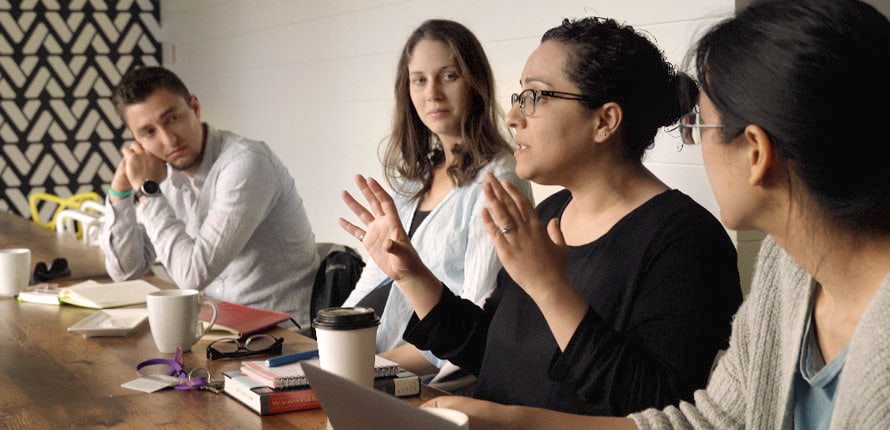Search for academic programs, residence, tours and events and more.
Co‑op
Our Master of Arts (MA) in Communication Studies program seeks students with open minds to explore new approaches to media, communication and culture in a challenging, rewarding and supportive environment.
Exploring the interplay of power and communication, our program provides advanced training in core theories and methodologies in communication studies and critically engages contemporary research themes in the discipline.

Our program is a critical “Communication Studies” one, in contrast to a business/administrative “Communications” one. The courses and structure of the program focus on learning academic research skills and critical theory, rather than on business aspects such as learning the skills of marketing and public relations.
While critical theory can, and does, inform numerous diverse career paths, including those in business/administrative communications, please read prospective course descriptions and Major Research Paper / Thesis titles to better understand our program’s approach to analyzing the important role of communication in society.
The MA in Communication Studies offers three options of study: major research paper and coursework; thesis and coursework; and coursework only. A co-operative education (co-op) program, with limited enrolment, is open to full-time students in any of the three options. The program is normally completed in 12 months (16 months with co-op) and must be completed within 24 months for full-time students. Applications for part-time study will also be considered.
The Major Research Paper (MRP) option is the default for admission. All students are accepted to this option and may apply to change to the thesis or coursework option after consultation with the graduate coordinator.
All students must complete two required courses: CS600: Graduate Seminar in Communication Studies and CS601: Communication Studies Research Methods.
Under the MRP option, students will take the two required courses (CS600 and CS601) and four elective courses in Communication Studies or a related area plus CS695*: Major Research Paper. You will take three courses in both the fall and winter terms. Under faculty supervision, you will complete your MRP in the summer.
The MRP is considered to be similar to a thesis in the quality and originality of research, but less than a thesis in scope. Research topics will be approved by the student’s advisory committee, which will normally consist of a supervisor and a second committee member (or reader). MRPs will be approximately 50 to 60 pages in length, not including bibliography and notes.
On completion of the MRP, the supervisor, any readers, and the Graduate Coordinator will determine if any revisions or further drafts are required. The MRP is graded on a pass/fail basis and there is no oral defence.
In exceptional circumstances, students may be allowed to complete the thesis option instead of the MRP option.
Students in the thesis option will take four one-term courses plus CS699: Thesis, consisting of the two required courses (CS600 and CS601) and two elective courses. The thesis shares the same basic properties and structure of the MRP, but is considerably larger in scope (100-120 pages) and must contain a substantive amount of original scholarly research.
Students wishing to write a thesis should consult with the graduate program director during the fall term of their first year. A thesis abstract, of approximately 500 words, is due December 15 to the graduate co-ordinator. The abstract, along with the student's academic record from the fall term, will be assessed by the graduate co-ordinator and the graduate committee and, if approved, a supervisory committee will be established. Students will be notified of the committee's decision within three weeks of the submission deadline. The committee will then decide upon a work schedule, using the MRP guidelines as a template.
On completion of the thesis, students will be expected to pass an oral defence of the work by an examining committee, which will include the student’s supervisor and reader(s), and an external examiner who is at arm’s length from the student. The purpose of the oral defence is to demonstrate to the examiners that the candidate fully understands the work that was completed, how the research was completed, and the meaning and significance of the findings and conclusions. The candidate must have a clear understanding of how the work fits with the relevant literature and/or practice. The thesis is graded on a pass/fail basis.
Coursework-only option students will take eight one-term courses.
The MA in Communication Studies program offers a Co-operative Education option. Co-op students have the unique opportunity to obtain paid employment and professional communication experience in non-profit organizations, the public sector, community groups, and organizations in creative industries. Co-op students are encouraged to pursue work terms in sectors and roles that align with their research interests.
The co-op option is a competitive entry and a limited enrolment option available to full-time students. Students in the co-op option complete their coursework in the fall and winter terms (September to April), have their co-op work term in the spring/summer (May to August), and write their major research paper or thesis in the subsequent fall semester (September to December), typically completing all MA program requirements in approximately 16 months.
Applicants indicate their interest in being considered for co-op when they apply to the MA program. Admission to the co-op option is not guaranteed by admission to the MA program in Communication Studies. Laurier’s Co-op Office may conduct interviews with shortlisted applicants and makes co-op option admission decisions.
Students who apply to the co-op option should not apply to the regular stream separately. If the co-op application is not recommended by Laurier’s Co-op Office, the application will be moved to the regular stream by the department.
The Co-op Office administers the work term application process. Students are required to apply to job postings and interview with prospective employers. While employment cannot be guaranteed, every effort is made to ensure that suitable employment is available for students admitted to the option. Students are welcome to seek out employment positions independently; however, these positions must be approved by the Co-op Office in order to be designated as co-op work terms.
Co-op students are required to pay co-op fees. Following their work term, co-op students are also required to submit to the graduate coordinator a short paper about their employment experience in relation to their coursework and/or research project. Co-op students must be registered in at least one elective course, CS695: Major Research Paper or CS699: Thesis in their final semester in the program.
Additional information and regulations are available on the Co-op website.
Here’s a small sample of MA Theses and Major Research Papers (MRPs) completed by our graduates:
We offer six courses each year. CS600 and CS601 are required courses. You must also register for CS695 or CS699 while working on your major research paper or thesis.
You are allowed to take up to 1.0 credit from other graduate programs with approval from the graduate coordinator. In the past, Communication Studies MA students have taken graduate courses in programs such as Cultural Analysis and Social Theory, English and Film Studies, and Applied Politics.
If you would like to learn more, full course descriptions are available.

"Through the program, I was able to refine my research, analytical and communications skills while developing collegial relationships with faculty and classmates, that helped secure my current position as a doctoral candidate in the Social and Behaviour Health Sciences Program at the University of Toronto."
Laura Neil (MA '17)
Take the first step in your graduate education and apply to one of our graduate programs. Follow our three-step admission process — we’ll walk you through how to apply and prepare for your first day as a graduate student.
After you have submitted your OUAC application, paid the non-refundable application fee, and Laurier has received your application, you'll receive an email from gradadmissions@wlu.ca advising you to upload the additional required documentation to Laurier’s Online Registration and Information System (LORIS).
Please note, the application process and the uploading of supplemental documentation, which includes references, typically takes two weeks. To avoid disappointment, apply early.
An application for admission to our MA program in Communication Studies must include:
Visit our Graduate Admissions Toolkit for more information about applying. Applications will be considered until the program is full.
Proficiency in written and spoken English is essential to graduate studies at Laurier. Applicants whose language of instruction during their previous postsecondary education was not in English must submit evidence of proficiency in English. If applicable, results from accepted testing services must be uploaded to LORIS.
Questions? Contact Jonathan Finn, graduate coordinator, at csgrad@wlu.ca.

"The MA program in Communication Studies at Laurier helped prepare me for my academic and professional goals in numerous ways, thanks to immensely supportive faculty who contributed to my learning and development."
Kathy Dobson
Winners of major external awards (OGS and Tri-Council) may be eligible for top-up funding which includes the Dean’s Graduate Scholarship (total value exceeds $10,000).
Eligible domestic students admitted to study on a full-time basis are entitled to one year of funding totalling, on average, $15,000. This support may be made up of teaching assistantships, internal/external scholarships, and/or faculty-funded studentships or research assistantships.
Domestic applicants are also encouraged to submit applications for the Canada Graduate Scholarships – Masters category (CGS-M) from the Social Sciences and Humanities Research Council of Canada.
While we cannot offer guaranteed funding to international students at this time, all international and domestic applicants are encouraged to apply for the Ontario Graduate Scholarship (OGS) by Jan. 31, 2024.
A list of all funding opportunities available to Laurier graduate students is available on our graduate funding webpage.

Our graduates have gone on to work in education, public relations and communications. Examples of jobs held by our graduates include:
ASPIRE is Laurier's professional skills development training program for graduate students. The program helps you craft an individualized, extracurricular learning plan tailored to your professional journey and entry to the workplace.
Learn about the interests of our faculty members. If you are looking for more information about this program, have questions, or want to set up a meeting, contact a member of our team.
Alexandra Boutros
Associate Professor
Shaunasea Brown
Assistant Professor
Check out Shaunasea Brown's podcast episode on building collective classroom care.
Colleen Kim Daniher
Assistant Professor
Greig de Peuter
Associate Professor
Jonathan Finn
Professor, Graduate Coordinator
Jenna Hennebry
Professor
Director, International Migration Research Centre
Andrew Herman
Associate Professor
Jeremy Hunsinger
Associate Professor
Penelope Ironstone
Associate Professor
Barbara Jenkins
Professor
Jordan Kinder
Assistant Professor
Sara Matthews
Associate Professor
Check out Sara Matthews' digital Canadian Cold War propaganda exihibit.
Jade Miller
Associate Professor
Judith Nicholson
Associate Professor
Chair, Communication Studies
Hillary Pimlott
Associate Professor
Nathan Rambukkana
Associate Professor
Ian Roderick
Associate Professor
Karen Stote
Assistant Professor
Peter Urquhart
Associate Professor
Think this is the perfect program to continue your education?